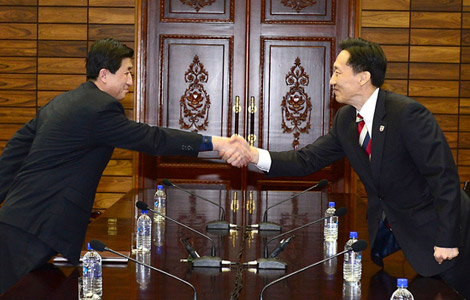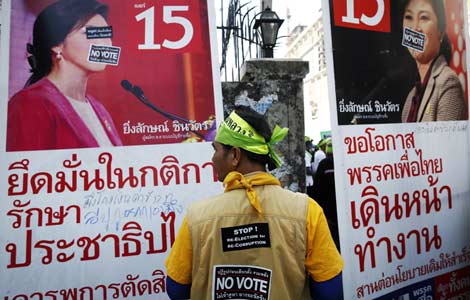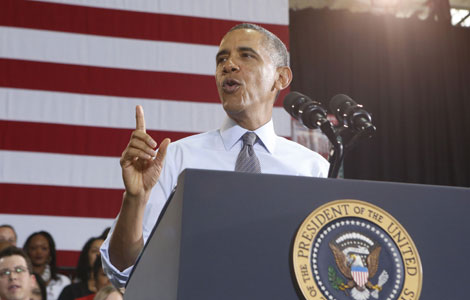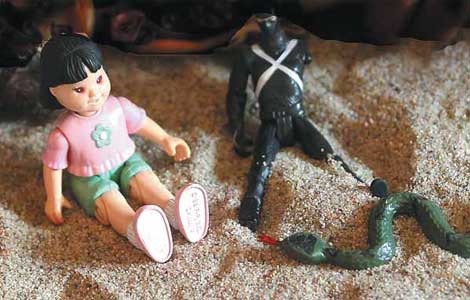Shanghai kindergartens to promote local dialect
Updated: 2014-02-07 07:44
By Wang Hongyi in Shanghai (China Daily)
|
||||||||
Children in 20 kindergartens in Shanghai will be encouraged to speak their local dialect in a pilot program by the city's education authorities starting this year. The move represents a change in the policy that promoted the sole use of Putonghua, or standard Mandarin.
The move is part of the city's efforts to protect the dialect, which is at risk of extinction, especially among young people, according to the working plan for 2014 of the Shanghai Municipal Education Commission.
Protecting the dialect is one of the major tasks for the city's language authorities, along with promoting Putonghua and regulating the use of foreign languages, said Yuan Wen, deputy director of the commission.
In 1992, China began to promote the use of Putonghua in a nationwide campaign that encouraged its use in classrooms. Students and teachers had to speak Putonghua in class, otherwise the school's annual assessment would be influenced.
Under the pilot program, children in 20 kindergartens in the city are encouraged to speak the Shanghai dialect during breaks and while playing games.
According to an online survey by news portal Sina.com, more than 60 percent of respondents support the pilot program.
"The mother tongue is the first language a person learns from birth. I grew up with the dialect, but my son doesn't speak it. I used to insist on speaking the dialect with my son at home, but he soon shifted to Putonghua, which was spoken in kindergarten," said Wang Yajing, a Shanghai resident.
"With less people speaking the dialect it will gradually disappear. It's necessary to work out ways to protect it," she said.
The dialect can trace its roots to the Wu dialect, one of China's oldest spoken languages, in use for more than 3,200 years. It was spoken in areas around Shanghai with its own grammar and vocabulary.
Before the 1990s, the dialect was widely used as the major language in Shanghai, equivalent to Cantonese in Hong Kong. Anyone speaking Putonghua in Shanghai would be thought of as "provincial".
Over the past decades, the country's financial hub has witnessed dramatic development. The large influx of people from other cities and countries has marginalized the city's native tongue. About 40 percent of the city's 23 million population were not born in Shanghai and the use of Putonghua has expanded.
A report by the Shanghai Academy of Social Sciences some years ago showed only 60 percent of Shanghai students could fully understand the local dialect.
Linguists, scholars, political advisers and residents rallied to rescue the dialect from extinction.
Political adviser Qian Cheng, who is deputy director of the Shanghai Comic Troupe, is among the group who are standing up to save their dialect.
"I have visited schools and found that many children have difficulty speaking the dialect, and many cannot speak it at all," Qian said.
Earlier this month, Qian and several other political advisers proposed that the city government should promote the dialect among children during its annual session.
"It's not merely the children who cannot speak the dialect. Even teachers were unable to speak it properly," said political adviser Wu Xiaoming, who is vice-president of the Shanghai Film Group.
In 2012, the first Shanghai dialect textbook was introduced in extracurricular classes and hobby groups.
The book, Learning to Speak the Shanghai Dialect for Pupils, teaches the dialect's usage through local folktales, rhymes, riddles and cartoons.
"This can be a fun and educational experience," said the textbook's author Qian Nairong, also the director of the Research Center of Linguistics at Shanghai University.
"Regional dialects are one of the pillars for local culture," Qian said.
Public services in Shanghai also promote the dialect.
Bus announcements are made in the dialect as well as in Putonghua and English, while Shanghai Airlines uses the dialect to announce passenger information.
The city's long-running News Workshop TV program started a Shanghai dialect version in 2012, becoming the first TV news program in China to be broadcast in the dialect.
But concerns have been raised, especially among the city's migrant population.
"I think the education authorities should consider the feelings of migrant children before implementing the program. When other children communicate in the local dialect, migrant children may feel alienated. I'm not sure whether it's good for their psychological growth," said a woman surnamed Liu.
Cheng Yuli contributed to the story.
wanghongyi@chinadaily.com.cn

 Chinese Lunar New Year gift from abroad
Chinese Lunar New Year gift from abroad
 Koreas reach out for family reunions
Koreas reach out for family reunions
 Storm to slam two-thirds of US
Storm to slam two-thirds of US
 Clowns gather for Joseph Grimaldi celebration
Clowns gather for Joseph Grimaldi celebration
 Thai caretaker PM urges protesters not to block voting
Thai caretaker PM urges protesters not to block voting
 Holy waters in Nepal
Holy waters in Nepal
 Kongfu stars wax shine in London ChinaTown
Kongfu stars wax shine in London ChinaTown
 Obama pushes minimum wage hike
Obama pushes minimum wage hike
Most Viewed
Editor's Picks

|

|

|

|

|

|
Today's Top News
Putin: Xi's visit a reunion with a good friend
Xi leaves for Sochi ceremony Thursday
China to bid on troubled Brazilian dam project
Flying Tigers denounce Abe's visit
China's oil demand is growing
Schroeder accuses US of disrespect
US criticism over ADIZ unfounded
US warns airlines about 'toothpaste bombs'
US Weekly

|

|




